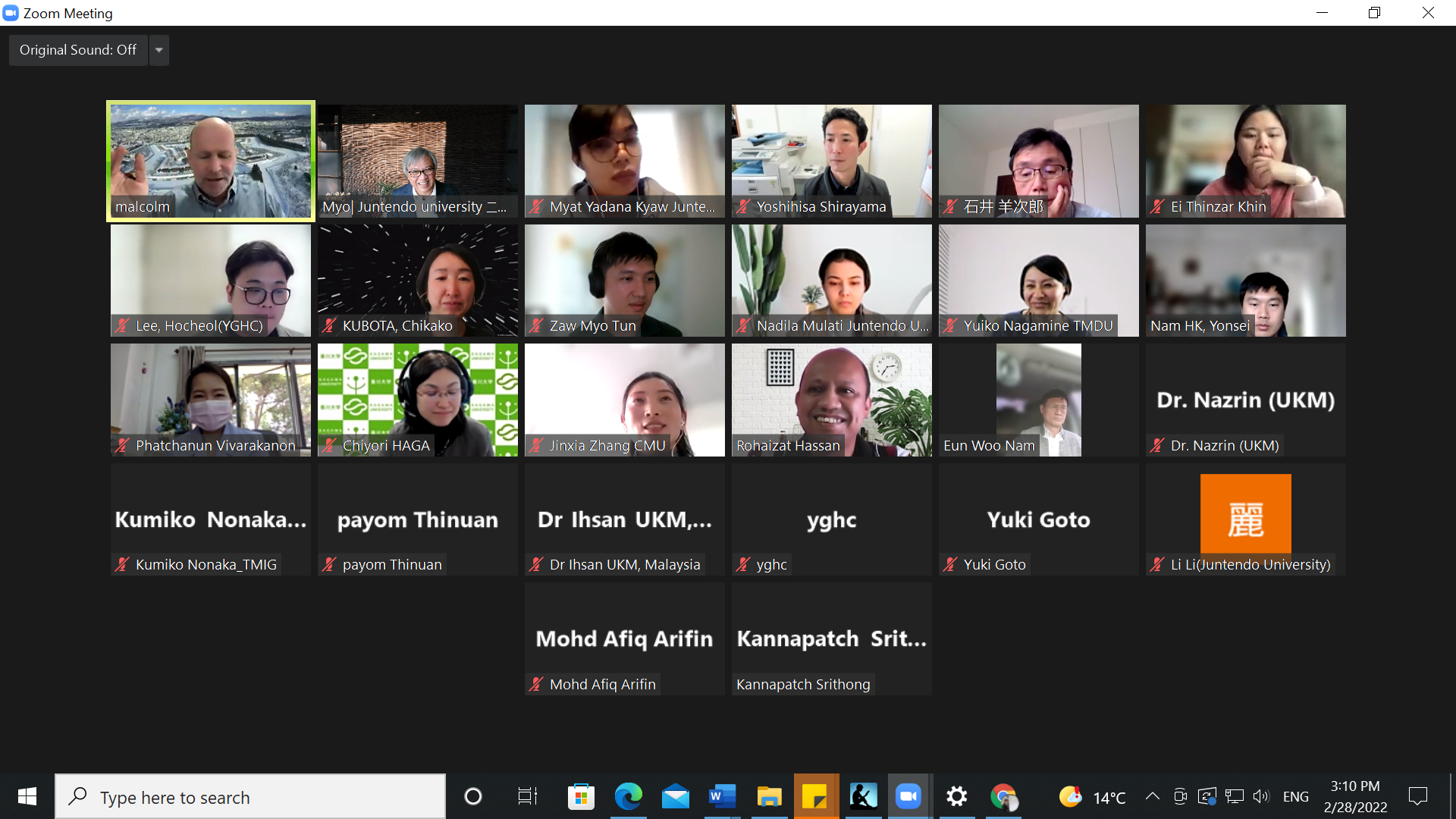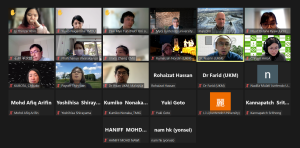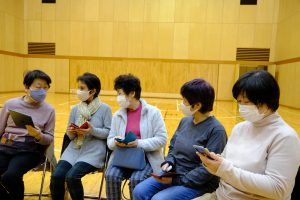9th DIHAC policy review meeting analysis report
Digital Intervention Studies Ongoing in the Republic of Korea, Malaysia and China
9thDIHAC policy review meeting analysis report
Myat Yadana Kyaw, Hocheol Lee, Mohd Rohaizat Hassan, Jinxia Zhang, Nadila Mulati, Ei Thin Zar Khin, Yuiko Nagamine, Myo Nyein Aung, Malcolm Field
Digital inclusion has been increasingly addressed as a new social determinant of the health, recently in the post COVID-19 pandemic era. Researchers increasingly applied digital technology, apps and skills in the intervention for healthy ageing, prevention of non-communicable diseases and beyond. There are challenges in digital intervention studies in terms of methodology, implementation science and evaluation. Furthermore, adoption of digital technology among the study participants, their digital skills, and e-health literacy are determinants of the intervention effectiveness. Therefore, we learnt from researchers implementing such interventions in the three Asian countries: ROK, Malaysia and China and, reflected on their first hand experiences, in this meeting.

Methodology: (1) We organized a virtual international meeting of investigators, DIHAC team and invited researchers, altogether consisting an international team of 26 multidisciplinary researchers. It took two hours. (2) A week later DIHAC team organized a halve-day long, a follow-up meeting to reflect the discussion and draw conclusion. (3) Further discussion through correspondence, analysis, writing report and publishing was carried out in a month.
The 9th meeting of Digitally Inclusive Healthy Ageing Communities took place virtually on 28th February,2022. Professor Malcom Field chaired the meeting and participants with diverse backgrounds including epidemiologists, sociologists and public health practitioners from the Republic of Korea, Malaysia, Singapore, Thailand, Japan and China attended the meeting. Presentations for this meeting took place around three intervention studies: two targeting digitally inclusive, healthy ageing and the other at diabetes care. Firstly, Dr. Hocheol Lee from Yonsei University, the Republic of Korea presented an interventional study about digital social prescribing in South Korea. Due to an unproportionally increase older population in rural area of South Korea(1) and a decrease in social participation is associated with development of depressive symptoms in senior citizens(2),the digital devices such as smartphones tablets and electronic watches are found to be a solution for social distancing derived problems(3). A 6-week digital social prescribing course which included basic functions of a smartphone, use of social media and internet banking was introduced to older people in study and evaluated for happiness, self-reported health status, depression scale, quality of life and cognitive function. Through this intervention, older people were able to increase their social contact, improve cognitive function, have easier access to health information provided digitally in Covid-19 era and this could be a way to fight Covid-19 blue for older people. As a discussion point, Professor Field added that it is also important to explore whether learning new things improves the cognitive function of older people or learning to use smartphones is a factor attributing to the cognitive function improvement of older people.

The second presentation was about a mobile phone application for diabetes management developed by Associate Professor Mohd Rohaizat Hassan, Dr. Mohd Nazrin Jamhari MD and team from the National University of Malaysia. With high prevalence of diabetes in all age groups in Malaysia(4), the application aimed to provide knowledge about the disease, improve compliance and aid the care provider in management of diabetes. Based on health belief model and recommendations from a group of experts formed by nominal group technique including family health doctors, public health physicians, and endocrinologist, this android app allows uncontrolled diabetes patients to record their sugar level, appointment date, medication taken and help the physician in charge to review the record in simple graph and figures. Although the application was not specifically developed for older patients, the culture of Malaysia where older people live together with the family(5) may be an entry point for this technology to diffuse into the care of older diabetes patients.
A mobile phone application for the prevention of dementia was introduced by Dr. Jinxia Zhang from the Capital University of Medicine, Beijing. Participants aged between 55 and 75 years who possess smartphone with modifiable risk factors for dementia were recruited and introduced with the application and the interventional participants have access to the coach portal where they can have motivational interviews with coaches for lifestyle modifications where the control group only has access to educational materials and lack interactive coach support. According to the Healthy Ageing Through Internet Counselling in the Elderly (HATICE) trial, mHealth interventions with human guided approach show effectiveness and feasibility in older people(6). The study is planned to follow up for 18 months and effectiveness and implementation outcomes are measured. Dr. Zhang also discussed the challenges during the recruitment and implementation that some participants found difficult in using some features of the application and the app was simplified after introduction. With the aim to reduce dementia for people in hard-to-reach areas, this application combines self-management care and coach-guided approach for the older people who are at risk of dementia.
Discussion points addressed in the meeting:
- To build a digitally inclusive society, empowerment is the key.
- Empowerment for the use of digital technology will form an important component in designing and delivery of age-inclusive interventions for global health.

To sum up, the 9th DIHAC meeting highlighted the use of digital intervention for preventing disease and promoting civil participation which would be applicable in pandemic and post pandemic era especially for older people, enabling them to fit in the age of digital technology. For a digitally inclusive society for the ageing population, physical access to ICT devices and technology will not be enough, digital skills and sustained use of accessible technology and devices are needed to be addressed (7) and digital social prescribing brought about by Yonsei University focused to overcome this divide. Challenges are also to be found out in introducing digital social prescribing to older people. The digital apps from Malaysia and China emphasised on the use of introduced technology for better health outcomes. The main difference between these two apps is with or without a human coached program and it will be interesting to explore challenges and sustainability in usage of these apps by older people.
References
- Sok SR, Cheon BK, Gu MK, Kim OS. Comparisons of Health Promoting Behavior, Depression, and Life Satisfaction Between Older Adults in Rural Areas in South Korea Living in Group Homes and at Home. J Nurs Res. 2019;27(3):e21-e.
- Noguchi T, Hayashi T, Kubo Y, Tomiyama N, Ochi A, Hayashi H. Association between Decreased Social Participation and Depressive Symptom Onset among Community-Dwelling Older Adults: A Longitudinal Study during the COVID-19 Pandemic. The journal of nutrition, health & aging. 2021;25(9):1070-5.
- Ammar A, Chtourou H, Boukhris O, Trabelsi K, Masmoudi L, Brach M, et al. COVID-19 Home Confinement Negatively Impacts Social Participation and Life Satisfaction: A Worldwide Multicenter Study. International Journal of Environmental Research and Public Health. 2020;17(17):6237.
- Institute for Public Health (IPH) NIoH, Ministry of Health Malaysia. National Health and Morbidity Survey (NHMS) 2019 Vol. I: NCDs—Non-Communicable Diseases: Risk Factors and other Health Problems. 2020.
- Mohd S, Senadjki A, Mansor N. Living arrangements of elderly: evidence from household income expenditure survey. Journal of Population Ageing. 2017;10(4):323-42.
- Richard E, Moll van Charante EP, Hoevenaar-Blom MP, Coley N, Barbera M, van der Groep A, et al. Healthy ageing through internet counselling in the elderly (HATICE): a multinational, randomised controlled trial. The Lancet Digital Health. 2019;1(8):e424-e34.
- Van Dijk JA. Digital divide: Impact of access. The international encyclopedia of media effects. 2017:1-11.
Myat Yanada Kyaw MD is PhD student at Department of Global Health Research, Graduate School of Medicine, Juntendo University, Tokyo, Japan.
Hocheol Lee PhD is a senior researcher at Yonsei Global Health Center, Yonsei University, Republic of Korea
Mohd Rohaizat Hassan is MD, PhD, Associate Professor, Head of Department, Public Health Medicine Specialist & Epidemiologist, Department of Community Health, Faculty of Medicine, The National University of Malaysia, and he is the President of Malaysian Association of Epidemiology
Jinxia Zhang MD is Lecturer, Department of Epidemiology and Health Statistics, School of Public Health, Capital Medical University, Beijing, China
Nadila Mulati is PhD student at Department of Global Health Research, Graduate School of Medicine, Juntendo University, Tokyo, Japan.
Ei Thin Zar Khin MD is PhD student at Department of Global Health Research, Graduate School of Medicine, Juntendo University, Tokyo, Japan.
Yuiko Ngamine MD, MSc, PhD is Assistant Professor, Tokyo Medical and Dental University, a family medicine physician and she is also member of JAGES study group.
Myo Nyein Aung MD, MSc, PhD is Associate Professor at Department of Global Health Research, Graduate School of Medicine, Juntendo University, Tokyo, Japan. He is also affiliated to Advanced Research Institute for Health Sciences and Faculty of International Liberal Arts, Juntendo University, Tokyo, Japan. He chaired the follow-up meeting.
Malcolm Field PhD is Professor of Social Science, Faculty of Social Sciences, Kyorin University, and Faculty of International Liberal Arts, Waseda University, Tokyo, Japan. He chaired the 9th DIHAC Policy review meeting.
